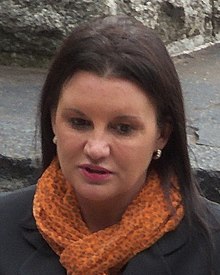Jacqui Lambie
|
Senator Jacqui Lambie |
|
|---|---|
 |
|
| Leader of the Jacqui Lambie Network | |
|
Assumed office 14 May 2015 |
|
| Preceded by | Party created |
| Senator for Tasmania | |
|
Assumed office 1 July 2014 |
|
| Personal details | |
| Born |
26 February 1971 Ulverstone, Tasmania |
| Political party |
Jacqui Lambie Network Previous affiliations; Liberal (before 2011) Palmer United (2013–14) Independent (2012–13; 2014–15) |
| Children | 2 |
| Residence | Burnie, Tasmania |
| Education | Devonport High School (attended) |
| Occupation | |
| Profession | Politician |
| Religion | Roman Catholicism |
| Website | Official website |
| Military service | |
| Allegiance | Commonwealth of Australia |
| Service/branch | Australian Army |
| Years of service | 1989–2000 |
| Rank | Corporal |
| Unit |
Transport Corps (1990–95) Military Police (1995–2000) |
Jacquiline Louise "Jacqui" Lambie (born 26 February 1971) is an Australian politician. She was elected as a Senator for Tasmania at the 2013 federal election representing the Palmer United Party. Her term began in July 2014. In November 2014, Lambie resigned from the Palmer United Party to sit in the Senate as an independent. In May 2015, she formed the Jacqui Lambie Network political party, established with Lambie as its leader.
Lambie was born in the town of Ulverstone in north-western Tasmania. Her parents separated when she was 13, and she was raised in a public housing estate in Devonport, attending Devonport High School until she left at Year 11. She took a year off before deciding to apply to join the army.
Lambie enlisted in the Australian Army in 1989, where she served for over ten years, first in the transport corps, and subsequently as a military policewoman. She achieved the rank of corporal.
During a field exercise in July 1997, Lambie suffered injuries that resulted in severe back pain. After physical therapy and medical interventions, she was unable to regain operational fitness and was discharged for medical reasons (thoracic pain) in 2000. She has since been an advocate for veterans with the Returned and Services League of Australia and involved in fund raising with the Burnie Chamber of Commerce, the Country Women's Association and Rotary.
The Department of Veterans' Affairs (DVA) initially rejected her application for compensation, but subsequently approved it and put her on a military disability pension. She later applied for compensation for depression related to her back pain, which was also initially rejected. The DVA hired a private investigation firm to conduct five hours of surveillance on her activities within her home. On the basis of this surveillance, the department concluded that she was a malingerer, cancelling her military pension and coverage of her medical care.
...
Wikipedia
